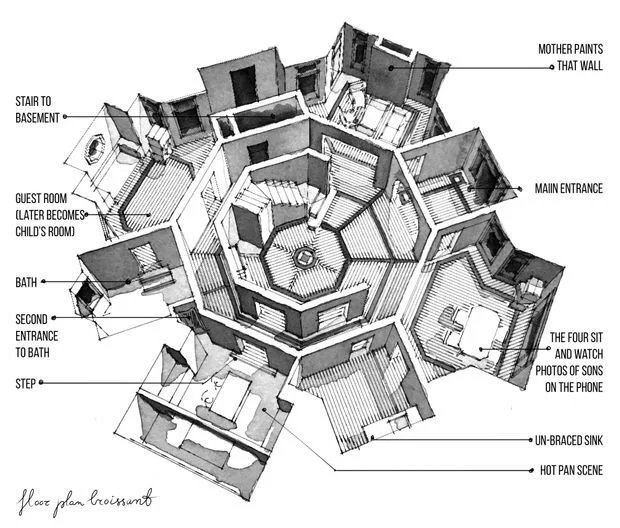Mother!
JADE
My favorite thing about Mother! is the spiritual and emotional life expressed in the walls of the house. The film illustrates the reality of seemingly inanimate spaces we usually perceive as merely background settings: in fact, they are living bodies, sometimes even more in tune with emotion and psychic situations than the humans occupying them. The house in Mother! anticipates action before it has occurred.
ALEX
An animistic universe is invoked, breathing with awareness and intelligence, and this resonates with the psychological experience of watching a movie: a trance-state that’s like dreaming, in which the viewer’s mind inhabits the image on the screen with their own symbolism and emotions.
The film’s greatest idea is to marry the house with the psyche. The camera goes in circles around and around Jennifer Lawrence’s face to catch all her reactions, and Lawrence goes around and around the circular house to witness all the chaos. She weds herself to the house, feels its pulse, and its heart is physically represented by the oil drums in the basement. I would have loved to see a Darron Aronofsky thriller that stayed grounded within this ‘house with tense co-inhabitants’ drama, but for Aronofsky the house is only a way to express his theme of ‘humans as a cancer on the planet.’
His chosen theme is beyond boring. I wanted to see the house! To explore every room with the exquisite camerawork and lighting Aronofsky has at his disposal. At the film’s start, Lawrence treats the house as sacred, and as an audience member I was immediately along for that ride. Can she show us each and every room, and what it represents to her and her man’s psyche?
JADE
The circular structure of the house and the beautiful subtlety of expression in the characters can only truly be expressed in film. Watching this movie, I had the rare and exciting experience that “This is something only film can do!”
I’m curious about the scene where the couple finally escapes into the long-walled off writing office. Here is the last untouched place in the house, where it is safe for a moment for Mother to give birth. The fact that so much atrocity can happen yet there remains this untouched place is strange in itself. This space represents a more precious part of the psyche, like a Shire which can remain untouched and pristine for at least a little longer. Lawrence’s character is far more protective of the sacredness of this space of His, than He is protective of her.
The surrealism permeating this whole film creates the strange sensation of being in a play. What is the nature of time in this space? At first, the place is timeless. Mother is young and He is old. We don’t know how long they’ve been living there and working on the house but we understand something essential about their romantic dynamic. In the second act, time begins to flow: now there is a baby on the way, a piece of work being is written and all the raw material from the beginning begins to come together to form a plot.
ALEX
I like the first act of the film the most, for this feeling it creates of watching a play. Treating the house as essentially another character creates such an intimate tactility that you do feel as if it’s all happening physically in front of you.
One’s house is where your imagination often flies farthest afield. It’s often where your mind spends the most time, and so is at its most active. An entrancing medium like film is beautifully suited to telling stories about a living house. The magic of Mother! is potent and visible in the pregnant silence draped over every morning-lit room of the first fifteen minutes, but just like Javier Bardem’s character, Aronofsky completely misses the story opportunities which this setting creates in pursuit of his *gollum voice* precious idea.
I detest this movie. I detest its ugly and self-righteous portrayal of humanity. That doesn’t change the mastery permeating every scene, particularly in the first two acts when there’s enough breathing space to appreciate the subtleties. The acting is of the highest caliber: completely embodied performances by the cast, made all the more remarkable by the strangely obtuse actions and dialogue which the script has assigned to them. The lighting creates an impression of velvety shadows clothing everything, while still showing up a tactile detail in faces and architecture both.
JADE
You say you detest this film, but you have so much to say about it. What you detest always gives us such fertile material for analysis. Work like this so geniusly expresses its tragic thesis that it lends itself readily to a philosophical rewrite, and for that reason, I think we both love it.
ALEX
He came so close to creating something truly alive and beautiful, so yes I feel strongly about it. A visceral feeling of panic and violation is the throughline of Mother!, and this is perhaps the film’s greatest achievement: to follow an emotion to its devastating end, then to (insanely) decide to continue past that point. The fever dream sequence of the third act is outwardly unbelievable, but emotionally felt as a possibility very early in the film.
Aronofsky said he wrote the screenplay in his own kind of fever dream, completing it in a dramatically short time. He felt what we felt, that here was an experience which only film could create. Yet it also reaches deep into the most profound archetypes he can see. The error he made was of hubris: He treated these huge symbols and feelings as simple, understandable, articulable pieces to be moved around however he liked. He then over-explained the entire meaning of the symbols in press interviews, effectively killing the mysterious magic of the archetypes.
JADE
Jennifer Lawrence is impossibly beautiful, walking around her house looking like a model out of a lifestyle magazine… or a mother goddess. I almost can’t appreciate her beauty at first, because of its hyperreality. She isn’t relatable: she’s archetypal. She’s not a woman, she is The Feminine itself. Portrayed this way, the beauty of The Homemaker, a woman who makes the living space, takes on a new significance. This is not merely a role of boiling water for tea or doing laundry, it is creative tending to the psychic and inner emotional world. Jennifer Lawrence appears as I would picture the greek goddess Hera, goddess of the hearth. This role is necessarily emotional. It’s not Lawrence’s place to “be chill” about an unexpected visitor arriving unannounced; it’s her place to be the voice of the emotional wind blowing through the space. Lawrence embodies the anima in this tale.
ALEX
Aronofsky’s artistic intent was to invoke the Christian God in relationship to a Gaea-hypothesis Mother Earth personality. But what we see and feel is the relationship of the artist towards his muse. Even more simply, what we see is two hours of Aronofsky violating and abusing a beautiful woman. Do the ends justify the means here? The director’s own beliefs color the entirety of the film. Painting humanity itself as only a malignant cancer upon an innocent and divine mother blinds him to the in-the-moment horror of abasing and destroying a beautiful woman on film. She’s just another earth-destroying human, after all; what does it matter if she’s put through humiliating experiences if it’s for art?
JADE
Aronofsky unwittingly replicates the dynamic he seeks to critique: He illustrates the creator god/mother goddess dynamic as a violation. Javier Bardem’s character feeds on the spirit of Mother, and she, the embodiment of love and life-force, is sacrificed to his poetic work. In this dynamic, the masculine sacrifices everything for his artistic vision, even and especially his feminine counterpart. Similarly, Aronofsky imagines his art to be something worth sacrificing everything for. He sacrifices Lawrence on the altar of his artistic vision. He believes that art is more important than everything else, more important than the humans that create it. For Aronofsky, humans are inferior to art. Like his God image, he forgets that the human soul is the source and first cause of what he worships.
ALEX
His break-out film Requiem For A Dream succeeds where Mother! fails, even though they’re both intensely dark and disturbing. I think this is because, as dark as it is, Requiem treats its characters with a basic respect. It’s a tragic film because these are basically good people encountering hardship. A piece of art performed by humans has little to stand on when you take away the basic goodness of the human being.



